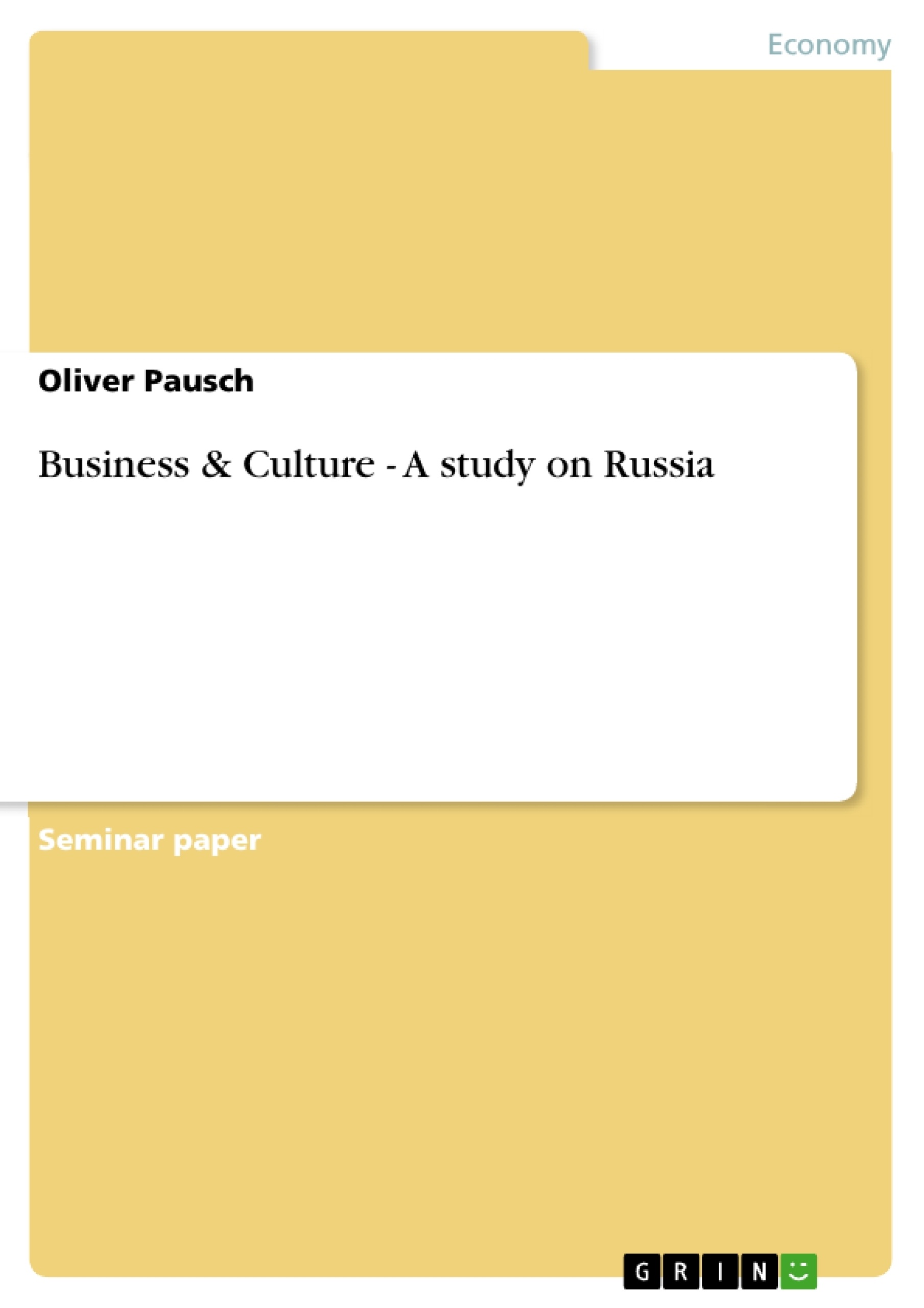The globalization of the economy and the constantly growing cooperation across national and cultural borders in education, business, science and technology foster increasing de-pendencies among nations. Furthermore, it necessitates a heightened awareness for inter-cultural issues and a substantial competence to deal with intercultural problems in political, educational, business and science organizations for the individuals involved. Political devel-opments like the unification process in Europe call into questions long established features and boundaries of national identity. Especially, the fall of the Iron curtain suddenly enabled close neighbors who had been separated for roughly two generations and who lost their knowledge of each other, if not, under the influence of the long ideological confrontation, even developed negative stereotypes of each other. The mentioned dramatic political changes in Eastern Europe make Russia an interesting point of interest. Therefore, this paper is intended to introduce and examine the historical, economical, political, societal, cultural and business developments that Russia encountered before and after this radical transition. Although, this paper provides a country overview to some extend, the main emphasis is on cross-cultural management where it is crucial to recognize and understand the covered areas besides business development, for they influence and, in the end, determine the basis of a country’s value and belief system. Finally, this paper provides a cross-cultural study by Geert Hofestede that should showcase the impact of cultural differences on management comparing Russia to other countries in the world on various cultural dimensions.
Inhaltsverzeichnis (Table of Contents)
- Introduction
- Russia in the past and today
- Historical overview
- The Ancient Russia
- The years of Mongol domination
- Imperial Russia
- Russia under the Soviet-Union
- Russia after the Soviet-Era
- Russia today
- Geography and climate
- Demographics
- Social Structure
- Religion, Language and Education
- Government and Politics
- Economy
- Foreign Economic Relations
- Historical overview
- Doing Business in Russia
- The Cultural Environment
- Formality, Status and Hierarchies
- Business Dress
- Greeting and Conversation
- Time Behaviour and Appointment Setting
- Negotiations
- Dealing with business problems and uncertainties
- Cross-Cultural Study: Geert Hofestede's Value Dimension model
- Power Distance (PDI)
- Individualism (IDV)/Collectivism (CV)
- Masculinity (MAS)
- Uncertainty avoidance (UAI)
- Long-Term Orientation (LTO)
- The Cultural Environment
- Summary
Zielsetzung und Themenschwerpunkte (Objectives and Key Themes)
This paper aims to introduce and examine the historical, economical, political, societal, cultural and business developments that Russia encountered before and after the fall of the Iron Curtain. While providing a country overview, the main focus is on cross-cultural management, emphasizing the crucial importance of understanding cultural differences in business development. The paper also includes a cross-cultural study by Geert Hofestede, showcasing the impact of cultural differences on management, comparing Russia to other countries on various cultural dimensions.
- Historical background of Russia, covering key events and figures
- Overview of contemporary Russia, including geography, demographics, social structure, religion, language, education, government, politics, economy, and foreign economic relations
- Cultural aspects of doing business in Russia, focusing on formality, status, hierarchies, business dress, communication styles, time behavior, negotiation strategies, and managing business problems and uncertainties
- Cross-cultural analysis of Russia based on Geert Hofstede's Value Dimension model
- The impact of cultural differences on management in a globalized world
Zusammenfassung der Kapitel (Chapter Summaries)
- Introduction: The paper highlights the importance of intercultural competence in a globalized world, especially in the context of political and economic changes in Eastern Europe, particularly focusing on Russia.
- Russia in the past and today: This chapter provides a historical overview of Russia, covering key dynasties, events, and figures from the ancient period through the Soviet era and into the present. It also examines contemporary Russia, including its geography, demographics, social structure, religion, language, education, government, politics, economy, and foreign economic relations.
- Doing Business in Russia: This chapter delves into the cultural environment of doing business in Russia, focusing on aspects such as formality, status, hierarchies, business dress, communication styles, time behavior, negotiation strategies, and dealing with business problems and uncertainties. It also explores the cultural dimensions of Russia based on Geert Hofestede's Value Dimension model.
Schlüsselwörter (Keywords)
This paper primarily focuses on Russia, its historical development, current socio-economic conditions, and cultural dimensions relevant for doing business. Key themes include cross-cultural management, intercultural competence, business practices, and cultural differences in a globalized world. It uses Geert Hofestede's Value Dimension model for analyzing cultural variations and their impact on management, specifically focusing on Russia in comparison to other nations.
Frequently Asked Questions
What is the focus of the study on Russia?
The paper examines Russia's historical, economic, and cultural developments, with a primary focus on cross-cultural management and business practices.
What does Hofstede's model reveal about Russian business culture?
It analyzes Russia based on cultural dimensions like Power Distance, Individualism/Collectivism, and Uncertainty Avoidance to explain management styles and societal values.
What are the cultural norms for doing business in Russia?
Key aspects include understanding formalities, hierarchies, specific business dress codes, and the importance of relationship-building during negotiations.
How did the fall of the Iron Curtain impact intercultural relations?
It enabled closer cooperation between nations that were separated for generations, requiring a new awareness of intercultural issues and the overcoming of stereotypes.
How is the social structure in contemporary Russia described?
The paper provides an overview of demographics, social structure, religion, and education as foundations for the country's current value system.
- Arbeit zitieren
- MSc. Oliver Pausch (Autor:in), 2006, Business & Culture - A study on Russia, München, GRIN Verlag, https://www.grin.com/document/70001



